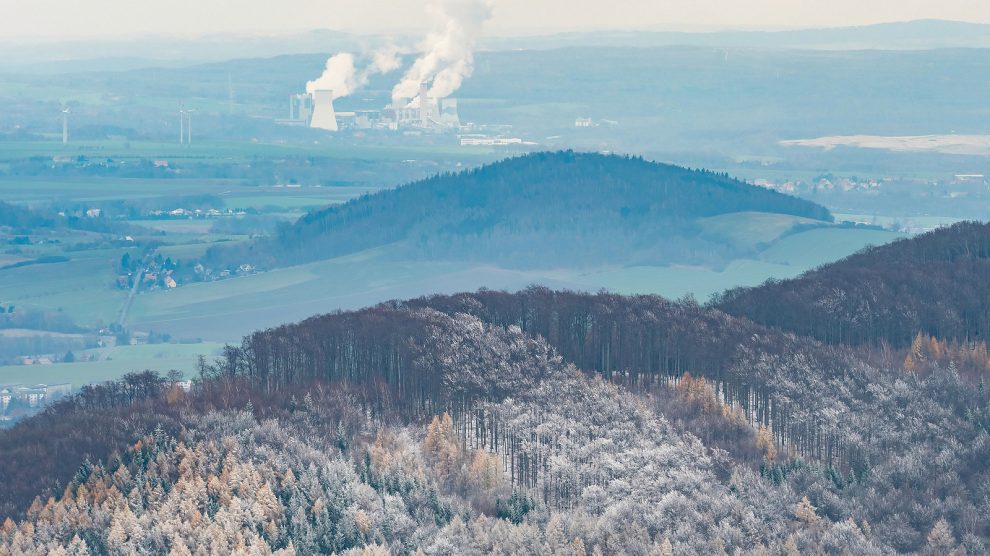Daily fines of more than half a million euros are unlikely to convince Poland to close a coal mine at Turów, close the Czech and German borders, say environmental groups.
Another week, another ruling against Poland from Europe’s top court.
On September 20, the European Court of Justice (ECJ) ordered Poland to pay a fine of 500,000 euros for each day it continues extracting coal at an open-pit mine near Turów, close to the country’s borders with both Czechia and Germany.
The Czech government had requested the court fine the Polish government five million euros per day.
- Poland set to defy ECJ ruling to close Turów coal mine
- Greenpeace steps up legal fight against Poland’s use of coal
- A Polish ‘mega port’ project is worrying German environmentalists
In May, the European Commission ordered Poland to halt operations at the Turów mine following a lawsuit brought by Czechia.
Poland has so far failed to comply with the order and the Polish government said in a statement Monday it would continue to do so, even though the ECJ ruling means it will have to pay the daily penalty.
“The Polish government will not close the mine. From the very beginning, we were of the opinion that the suspension of the works of the mine in Turów would threaten the stability of the Polish power system,” said Polish Government Spokesperson Piotr Mueller in a statement.
Damaging water supplies
The Czech government’s lawsuit against Poland, filed in February, has widened a dispute between the two countries related to the environmental costs of coal mining. The Czechs have said mining at Turów is sucking up water supplies and damaging Czech communities.
“The Polish government has so far refused reasonable requests to stop its Turów mine from damaging the water and homes of citizens in Czechia and Germany. Ignoring a court order is outrageous,” says Zala Primc, a campaigner at the environmental pressure group Europe Beyond Coal.
“The Polish government needs to immediately halt destructive mining, and address the underlying issues around Turow’s legality and impacts on water supplies. It needs to plan a fair closure of Turów, and the rest of its coal industry, by 2030 at the latest.”
Poland had hoped to negotiate a settlement with the Czechs that would allow the mine to remain open, but months of talks have yet to bring about a resolution.
According to Petra Urbanova, a lawyer at the Czech office of Frank Bold, which specialises in social and environmental disputes, the ECJ ruling is the first of its kind.
However, she says that it will likely will not be enough to protect Czech citizens from damage caused by Turów.
“The Polish government has made it abundantly clear: it has no intention of telling PGE [the state-owned power company that owns Turów] to halt operations at the mine, and is willing to absorb a fine ten times the size.
“Should the Polish government continue to refuse to comply, the European Court of Justice and European Commission must use the other levers at their disposal to convince Poland to comply, or a precedent will be set, whereby countries can simply buy their way around EU law,” says Urbanova.

Just Transition Funds at stake
The Polish government’s refusal to back down may also jeopardise its ability to access Just Transition Funds, non-reimbursable grants that are the European Union’s key tool to support regions most affected by the transition towards climate neutrality.
The Just Transition Fund has an overall budget of 17.5 billion euros for 2021-27.
“The money that the Polish government will waste paying this fine would be better spent helping the people living in the Zgorzelec region justly transition to new jobs,” says Katarzyna Kubiczek, project manager from the Polish ecological association EKO-UNIA.
“Unfortunately, the failure by the Polish government and PGE to plan for this inevitable change means that not only is money being wasted on fines, they will also lose far larger amounts of financial support from the Just Transition Fund.”
“It’s not too late for PGE to change its mind about Turów and start planning for an earlier closure of the plant and mine complex, but the region has already fallen behind the likes of Eastern Wielkopolska, which is making good strides towards being coal-free by 2030,” adds Kuba Gogolewski of Fundacja Rozwój TAK – Odkrywki NIE, another environmental group.
“Further conflict benefits nobody. The fines will fall on Polish taxpayers, PGE will inevitably face further legal challenges from Czech civil society, and the Bogatynia region [in which Turów is located] will soon realise it’s been hung out to dry.”
According to the International Energy Agency, 80 per cent of Poland’s domestic energy came from coal in 2019, compared to 54 per cent in the Czech Republic and 43 per cent in Germany.
In June, Poland’s Łódź region has announced that the European Union’s most polluting coal plant, Bełchatów, will close by 2036 and its mines – also owned by PGE – by 2038.
Bełchatów has pumped more than one billion tonnes of CO2 into the atmosphere since 1982.
Under the closure plan, lignite-burning at Bełchatów would be reduced by 80 per cent by 2030 and stopped outright by 2036: not soon enough, say environmental campaigners.
“PGE wants to spin this announcement as an example of it helping the Łódź region to access the EU Just Transition Fund. In reality, Bełchatów’s closure is being forced upon PGE by coal’s demise and will inevitably come this decade, not the next,” says Joanna Flisowska, head of the climate and energy unit at Greenpeace Poland.
Unlike many news and information platforms, Emerging Europe is free to read, and always will be. There is no paywall here. We are independent, not affiliated with nor representing any political party or business organisation. We want the very best for emerging Europe, nothing more, nothing less. Your support will help us continue to spread the word about this amazing region.
You can contribute here. Thank you.







Add Comment